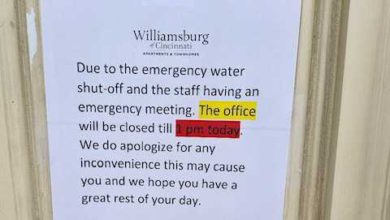After 17-year-old Robert Wright died in a juvenile detention center last year, it took five months for his family to learn anything about what happened. But the other teens who lived with him felt like they knew right away.
Robert was found dead, alone, in his bed locked in his cell at the Circleville Juvenile Correction Facility in August.
Five months later, an autopsy revealed he died from "amphetamine intoxication with contributing congenital cardiovascular disease."
Further tests showed the amount of amphetamine in his system was small, unlikely to cause an overdose. But the Department of Youth Services investigation into the death showed Robert had been bringing up an ongoing health concern; his family says it was chest pain.

Youth specialists at the facility told investigators Robert had signed up for a "health call" around the beginning of August, but a week and half passed and he was never seen.
Robert had a nurse appointment Aug. 17 and a telemedicine appointment Aug. 21.
On Aug. 30, a youth specialist heard another staff member leaving Robert's room tell the teen: "I'm not sure what's going on, but you need to sign up for (a) health call."
Robert was scheduled to be seen on Aug. 31, but never made it. He was found dead in his room that morning.

'He may still be here if medical would have addressed his concerns'
The eight other youths that lived in Robert's unit were interviewed on Sept. 2, just a few days after his death.
In its report, DYS redacted all mentions of health-related matters citing privacy laws.
The report states seven of the eight youth mentioned that Robert had complained of the same thing. It's also clear that the interviewers asked the youth about Robert's medical concerns.
"In my opinion, he may still be here if medical would have addressed his concerns," one youth said. "I feel the facility is a little slow in processing things."
"On a daily basis, he would voice concerns to the nurse that REDACTED," another youth told investigators. "Look at (the) health call to see if he filed this issue with medical and whether it was dealt with."
"He always said REDACTED," another third teen said. "He told medical a couple times. They never called him up."
"I just want to know if the state is paying for the funeral," a youth said.
Robert died on a Monday. The interviews of the other youths were completed that Wednesday by facility resource administrator Tim Mahaffey.
Mahaffey was fired from DYS in 2012 after a youth was inappropriately released with no support or resources in an unfamiliar city after a court hearing. Mahaffey appealed his removal and settled the case in 2017 and returned to work that March.
DYS removes doctor and medical director
When the Department of Youth Services released its internal report on Robert's death in April, it also announced a laundry list of high-level changes to their medical staff and structure.
The medical director was removed along with the Circleville physician. A new director of nursing was hired. An additional nurse was added to Circleville. A new "quality improvement manager" position was created.
Despite all this, DYS will not say what, if anything, went wrong with Robert's care.
"In the course of the investigation, some facility staff expressed confusion and frustration with instruction on medical processes from the Central Office medical team," the department said in a statement. "We have since gone in a new direction with our Central Office medical team and found this an appropriate time to bring in fresh ideas and perspectives."
DYS also won't say that these changes are due Robert's death.
"DYS is not able to discuss this youth’s medical care as it is confidential health information," another statement said. "Changes in medical leadership reflect DYS’ ongoing efforts to ensure the highest quality of care for youth in custody."
Several staff members – including those who skipped or slept through rounds in the time leading up to Robert's death – face discipline. That process is still ongoing.

Another medical-based case
In 2011, another teen sued several staff members at the Indian River Juvenile Correctional Facility claiming they had ignored his medical issues.
According to court records, Clarence Sanford reported leg and hip pain to the nurses at the facility in September 2007. He was given over-the-counter painkillers.
He brought up the pain again about three weeks later. He received the same treatment. The next day, again, he received the same treatment.
About six weeks later, another health concern and another dose of Tylenol.
On Nov. 28, he was carried to the nurse by other youth. He was given Motrin.
On Nov. 29, he was room-bound in the morning due to pain. More Motrin. That night, he had a fever of 100.1. More Motrin.
During all these encounters, the nurse never alerted a doctor or a supervisor, the lawsuit states.
On Dec. 2, Clarence was hospitalized and doctors found a fractured hip, sepsis and diffused pneumonia. He was hospitalized for 20 days and had to undergo surgery.
It took more than 70 days from his first complaint of pain to see a doctor.
"(The) defendants refused to provide timely and urgent medical care," the lawsuit said. (The) defendants actions and commissions subjected (Clarence) to cruel and unusual publishment."
The lawsuit was filed in 2011. In 2015, the case ended with a private settlement.
'This stuff still haunts me'
Consandra Wright, Robert's mother, still can't sleep.
"This stuff haunts me still to this day," Wright said. "This stuff is wrapped around my brain every day. I'm a wreck."
She's been to Circleville twice to protest since her son's death. She said her search for answers is not over.

"They can't shut me up," she said. "I'm fighting for closure. I'm fighting for sanity."
She keeps reading over the report that outlines all the issues that led to her son's death just months before he was due to come home: the medical issues, his possible access to drugs, staff sleeping on the job while he was likely dying in his room, a lapse in CPR certifications that may have delayed first aid.
"Somebody knows something," she said. "I know they were negligent. They didn't do their jobs. Someone has to know how the drugs got in there."
Wright said she believes there is information being hidden, and said she has no plans to stop seeking justice for her son.
"I have a lot of time to think about this stuff because that's all I do is think about it," Wright said. "When I have no more questions, that's when I'll be done."
Source link









